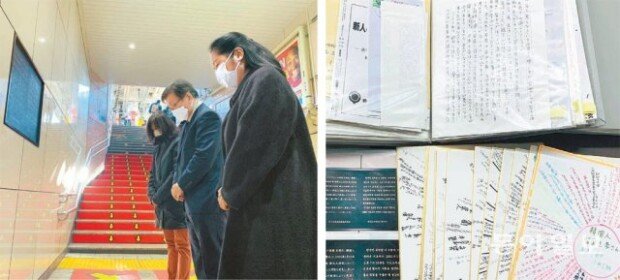Lee Su-hyun is the bridge between S. Korea and Japan that still lives on
Lee Su-hyun is the bridge between S. Korea and Japan that still lives on
Posted January. 25, 2021 07:27,
Updated January. 25, 2021 07:27


This reporter met with three Japanese who were giving a silent prayer in front of the stair-wall at the Shin-Ōkubo Station in Tokyo at 1:00 p.m. on Wednesday. It was a place to pay tribute to late Lee Su-hyun (1974-2001) who died while saving a Japanese citizen who fell on the train track at around 7:15 p.m. on January 26, 2001. Three of them visited the place before the official memorial ceremony to be held on Tuesday, marking the 20th year of his death.
“I’ve never forgot his name for the past 20 years,” said Arai Tokiyoshi, head of Japanese language school Akamonkai where Lee attended before he died. Tokiyoshi ran to the police station to report the tragedy right after the accident and has been leading memorials for him for the 20 years. “He improved the South Korea-Japan relations, which numerous diplomats failed to improve,” he said. He said Lee worked at an internet café everyday until 5:00 p.m. “Lee got off work late that day because he had to fix computers. The tragedy could have been prevented if he got off work on time,” he said.
“Lee taught me that sacrifice and consideration for others go beyond borders. I’ve been donating to thank him for teaching the lesson,” said Yamamoto Hiroko who has been donating to ‘LSH Asia Scholarship’ founded in 2002. “I sent my daughter to Korea three years ago to study in Korea University where Lee attended,” he added.
The LSH Asia Scholarship founded in 2002 to remember Lee has more than 1,000 beneficiaries. A donor sent 12,600 yen to remember the date of Lee’s death.
Director Nakamura Satomi produced a documentary film “Kakehashi (The Bridge for Tomorrow),” which depicted the story of Lee’s and his parents’ and has screened it in 15 cities in Japan since February 2017. “I feel honored whenever I see an audience who says Lee is alive in our heart,” he said.
“Lee would have lamented the aggravated relations between Korea and Japan if he were alive,” said the three visitors. They said they should remember his noble spirit. The Japan Railways Group which operates the train station has been providing the advertisement fee (10 million yen) for the periodical published by the scholarship. The Japanese Airlines has been paying for the flight tickets of Lee’s parents every year.
The 20th memorial to be held on Tuesday will be on a small scale due to circumstances coming from COVID-19. Lee’s mother Shin Yoon-chan (71) will not be able to attend the memorial for the first time.
bsism@donga.com







